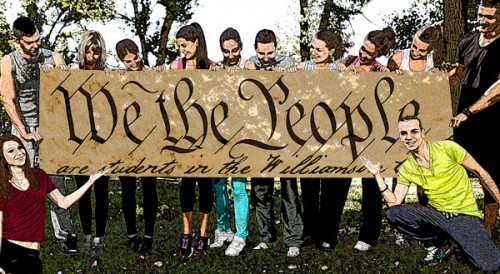A wide-ranging technology acceptable use policy for students in a Tennessee school district has led to accusations by the Electronic Frontier Foundation (EFF), a nonprofit digital rights group, and the American Civil Liberties Union (ACLU) that the district is violating students’ free speech and constitutional rights not to be searched.
In late October, the EFF received notification from Todd Pomerantz, a concerned parent in the Williamson County (TN) Schools district (WCS). Pomerantz had recently reviewed the district’s Acceptable Use, Media Release, and Internet Safety Procedures. His signature on the policy was required in order to allow his daughter to participate in school activities on campus computers.

Photo montage source: Thinkstock Images
Pomerantz’s concerns with the policy led him to not sign the form, and as a consequence, his daughter was denied participation in a class assignment. At issue for Pomerantz were the policy’s statements that appear to put constraints on students’ constitutional right to free speech and suspicionless searches. The acceptable use statement maintains that students in grades three to 12 may bring their own technology (BYOT) to WCS campuses and also that “the school district may collect and examine any device at any time for the purpose of enforcing the terms of this agreement, investigating student discipline issues, or for any other school-related purposes.”
After reviewing Pomerantz’s letter, the EFF staff sent information about WCS’s tech policy to the Tennessee branch of the ACLU (ACLU-TN). Thomas Castelli, ACLU-TN legal director, then penned a letter to WCS board members and the school system’s superintendent, Mike Looney, outlining what the ACLU says are breaches of constitutionality. In defending students’ constitutional rights on campus, the ACLU called up a 1969 legal precedent protecting students’ constitutional rights within school grounds. In that case, relating to free speech, the Supreme Court ruled that Iowa students were allowed to wear black arm bands to support the anti-Vietnam War effort: “As the United States Supreme Court famously held in the landmark case Tinker v. Des Moines Independent Community School District, students do not ‘shed their constitutional rights…at the schoolhouse gate.’”
“My daughter shouldn’t have to trade away her rights to free speech and privacy just to get a quality education,” Pomerantz states in an ACLU media release.
Jamie Williams, Frank Stanton legal fellow at the EFF, told SLJ that while the WCS policy is “well intentioned and designed to see to student safety and network security,” in the end it “opens doors to abuse of rules.” In comparison, the Metro Nashville Public Schools’ policy on BYOT items clearly outlines when and why technology could be confiscated and the steps for students and parents to follow if an infraction occurs.
WCS’s acceptable use policy also grants the school the option to install of a mobile device management client “for the purpose of managing the device while on the WCS network.” Castelli’s letter to the WCS board notes that the policy “permits a search of any BYOT device…whether or not the interest underlying the search is important or compelling. The policy also places no limits on the type of data that can be extracted from the device during the search or how the data can be used.” He concludes that there is potential for “arbitrary and abusive” use of these searches.
WCS policy rules about social networking among students on and off campus also concerns Pomerantz. “Students participating in any social media site are not permitted to post photographs of other students or WCS employees without permission from a teacher of administrator,” according to the WCS policy, which adds, “Personal social media use, including use outside the school day, has the potential to result in disruption to the classroom. Students are subject to consequences for inappropriate, unauthorized, and illegal use of social media.”
“[T]he policy’s social media guidelines impermissibly restrict students’ constitutionally protected off-campus speech,” according to an EFF article about the WCS policy by Williams and EFF staff attorney Nate Cardozo.
Williams points out that students must sign off on all aspects of the district’s tech policy in order to participate in school activities on school computers, WCS is “[f]orcing students to use school equipment to participate in school functions means forcing them to give up their rights.”
In his letter to Looney and the WCS board, Castelli wrote that “denial of participation in WCS’s computer and Internet program does not merely deny students a benefit, it denies them an equivalent education—to which they are unquestionably entitled.” He adds that computer and Internet access “are, in this modern world, fundamental to a complete education.”
“Our attorneys are looking into the letter from the ACLU and will be providing a response,” a representative from the WCS Board told SLJ. “Until then, it would be inappropriate for the Board to comment.”
According to a local media source, the Williamson Herald, Looney released the following statement in response to the ACLU-TN’s letter: “Our attorneys are reviewing the request…The district remains committed to protecting the constitutional rights of our students while maintaining a safe and secure learning environment for them.”
During a WCS board policy committee meeting on November 3, the technology policy did not appear on the formal agenda, according to Lindsay Kee, Communications Director for ACLU-TN. Leading up to a full session Board meeting on November 17, Williams said he hoped for a “quick conclusion” and an immediate recall of the policy. The more attention this issue receives, he said, “the better to make good policies from the beginning” for other school districts as they manage their own technology programs. As of November 21, he had not hear from WCS, and the school board did not respond to SLJ’s requests for comment.
April Witteveen is a community and teen services librarian with Deschutes Public Library in Central Oregon. She is the upcoming chair of the Printz 2016 Committee and has served on the YALSA Board.


